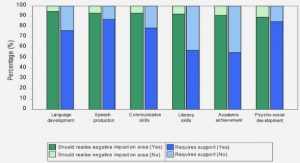Get Complete Project Material File(s) Now! »
Methodology
“A researcher’s methodological approach, underpinned by and reflecting specific onto-logical and epistemological assumptions, represents a choice of approach and research methods adopted in a given study” (Hay, 2002). Principally, the progression of any re-search is based on an inclusive plan for the activities necessary to expand the knowl-edge. Therefore, the research should be started with clear problem discussion, followed by the theoretical reference of it, to construct a proper research design for expanding knowledge. Finally, the last step is data collection followed by data analysis to derive results from the collected data. This is the summary of the procedures used to organize the research process. The following parts will consider different research methodolo-gies, and motivate the reason of selecting particular methods.
Research approach
While doing a research project, it is crucial to choose between different researches ap-proaches that would be best suit to the research. Understanding to these approaches is fundamental to enhance the efficiency of the study. Moreover, the extent to which we are clear about the theory at the start raises an important question concerning the design of research project. This is whether research should use inductive or deductive approach (Saunders et al., 2007).
Inductive research is approach in which theories are emerged from specific observation. In deductive approach, the explicit expectations of a hypothesis are built base on general principle: we commence from existing theory and then find its confirmation. Inductive research is open-ended and exploratory mainly in the beginning. Deductive research is specific in nature and is involved testing or confirming hypothesis (Srivastava et al., 2011). Figure 2-1 illustrates the main points of differences and steps involve in each ap-proach. In fact, all studies that have taken place in different contexts are a continuous cycling of induction and deduction approaches and combination of both (Srivastava et al., 2011; Saunders et al., 2007).
Initially we decided to conduct a deductive approach, so we started with an in-depth lit-erature review to find a proper theoretical framework to describe influences of IQ issues on decision-making and utilize it as guidance to collect data and test hypothesis. Since our theoretical framework is not comprehensive enough to be tested through data collec-tion and yielding a sufficient answer to our research question so we decided to employ it as guidance for developing interview questions to observe these influences and ending with a conclusion or a theory (inductive rezoning). Also starting a kind of inductive re-search from a theoretical perspective link our research into the existing body of knowledge in our subject area, help us to get started and provides us with an initial ana-lytical framework (Saunders et al., 2007).
To sum up, this study is neither pure inductive nor pure deductive. It inherited compo-nent from both approach, but mostly toward inductive. We started with literature review and we could only figure out 13 dimensions that affect quality of information (figure 3-but not influences of these issues on business performance. Therefore, this theory used to investigate and identify information quality issues in our selected case. The the-ory provided us a prospective during empirical data collection and analyzing quality is-sues in the company. Moreover, after the empirical data collection and identifying IQ issues in the case, the inductive reasoning used to categorize data and discover influ-ences of identified IQ issues on decision making which has not been considered in the theoretical framework. According to Figure 2-1, we tried to commence with a theory (left side of picture), to deduce the information from the sample. The theory used to ob-serve and investigate IQ issues. Then it became somewhat inductive given that the in-terviews functioned as the step “observation” of the right side in Figure 2-1, to recog-nize pattern and identify relationships between collected data to come up with a theory about influences of IQ issues on decision-making and business performance. Such ap-proach enabled us to present subjective analysis with the help of real life example.
However, this developed theoretical position then need to be deductively tested for its applicability through subsequent data collection and analysis, which is going to be ad-dressed in ‘Discussion’ section later as a suggestion for further work. This implies the continuous cycling of induction and deduction approaches highlighted by Srivastava et al., (2011) and Saunders et al., (2007).
Research design
Research purpose
In order to formulate the research question, we necessarily started to think about the re-search purpose. The categorization of research purpose most often suggested in litera-tures is the one of exploratory, descriptive, and explanatory (Saunders et al., 2007).
The purpose of descriptive research is to draw an accurate profile of individuals, events, or circumstances (Robson, 2002). Causal relationship between variables can be estab-lished by explanatory research. The stress is on examining a circumstance or a problem for explaining the association between variables (Saunders et al., 2007). An exploratory research, which is adopted for this thesis, is valuable way of understanding what is oc-curring; to look for new insight; evaluate events with asking questions (Robson, 2002). There are three leading methods of carrying out exploratory study; search of literature, interviewing expert in the context of research, and conducting focus group interviews (Saunders et al., 2007). In addition, exploratory research is generally carried out, if there is no former theory/ model to lead us or if we wish to have, some initial idea to find out the problem to be studied (Srivastava et al., 2011).
The purpose of this research is to design an exploratory study. Since we did not know much enough about the situation, which was influences of different dimensions of In-formation quality on decision-making and yet we wanted to have some assessment.
However, we could not find Information, theory, or model available as to how same problem was solved in the previous researches. Therefore, through the extensive litera-ture review we tried to create a framework that would lead us in gathering relevant em-pirical data by conducting focus group interview with expert BI users/ implementers. Through the exploratory study, we focused on understanding more about the topic and identifying variables that could be cause of low quality of information and influences of these variables on decision-making.
Research strategy
In this part, we concentrate our attention to the research strategy that is adopted in this thesis. According to the Yin (2003) for exploratory, descriptive, and explanatory study, we can utilize each of the research strategies. Some of these strategies obviously fit to deductive approach, and some of them to the inductive approach. In some cases, allot-ting strategies to one approach or another is unduly oversimplified. The selection of re-search strategy is directed by research question and objective, the degree of existent knowledge, available time and resources, in addition to philosophical approaches (Saunders et al., 2007). According to Saunders et al. (2007), different strategies that can be employed include experiment, survey, case study, action research, grounded theory, ethnography, and archival research.
Robson (2002) specifies case study, which is employed in this research, as a strategy for conducting research, which includes an empirical study of a specific existing events within its real world context by means of different source of evidence. The case strategy was of specific interest to us, since we desired to obtain a rich perception of the field of the research and processes being enacted (Morris and Wood, 1991). Additionally, case study has noticeably capability to generate responses to the question ‘Why?’, ‘What?’, and ‘how?’ therefore it is employed in this study (Saunders et al., 2007). However, an-swers to ‘What?’ and ‘how?’ questions of this study predisposed to be more the concern of survey strategy (Saunders et al., 2007) but due to the lack of time and resources it was somehow impossible to conduct a survey study in industry. Data collection tech-niques used for this strategy may be different and are possibly to be utilized in combina-tion. They may involve, like interview, observation, and questionnaire (Saunders et al., 2007). Also, according to Yin (2003) case study strategy is suitable for this research since the form of research question is ‘how?’ and the focus was on contemporary events and it did not require control of behavioral events (figure 2-2).
1 Introduction
1.1 Background
1.2 Problem discussion
1.3 Research objectives and questions
1.4 Interested stakeholders
1.5 Delimitation
1.6 Definitions
2 Methodology
2.1 Research approach
2.2 Research design
2.3. Literature sources
2.4 Data collection
2.5 Analysis
2.6 Research credibility
3 Theoritical frame of reference .
3.1 Business intelligence
3.2 BI support for decision making
3.3 Definition of data and information quality
3.4 Evaluation of information quality
4 Empirical findings
4.1 About the BI unit
4.2 Areas and benefits of using BI system
4.3 BI architecture
4.4 Reasons and affects of poor information quality (BI developer perspective)
4.5 influences of poor information quality (Business perspective)
5 Analysis
5.1 Areas and benefits of using BI system
5.2 Issues affecting the quality of information
5.3 influences of poor information quality (BI developer perspective)
5.4 influences of poor information quality (Business perspective)
5.5 importance of documentation (additional analysis)
5.6 summary of the analysis
6 Conclusion
7 Discussion
List of references
GET THE COMPLETE PROJECT
Efficient Business Intelligence sys-tems utilization Deliberation of information quality significance on decision-making






